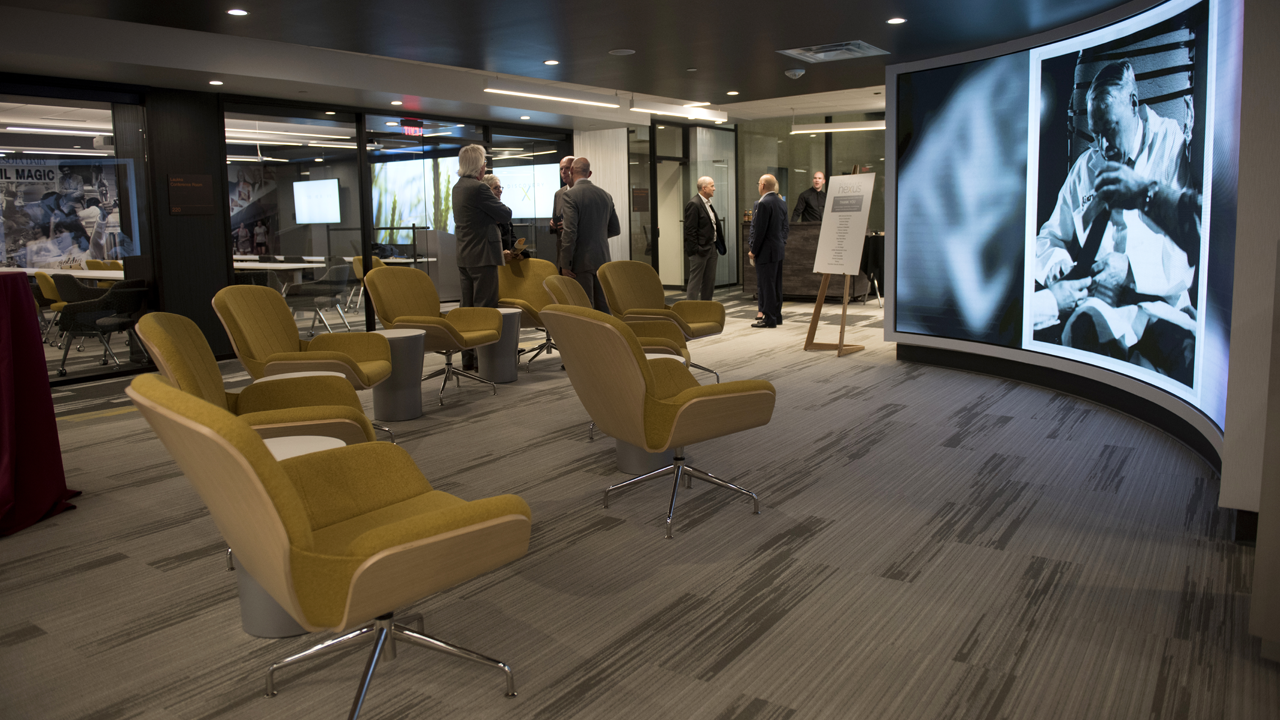
A new collaborative center at the University of Minnesota aims to expand the impact of University research and innovation.
The Discovery Nexus, which officially opened in McNamara Alumni Center this week, will bring University faculty, staff, and students together with businesses, entrepreneurs, and economic development leaders to form new collaborations, advance University innovations, and promote economic development.
U of M President Eric Kaler said the Discovery Nexus’s focus on forming connections, or “nexuses,” will help ensure University innovations reach society and make a positive impact.
“It’s the nexus part that gives life to those discoveries, and it’s the nexus part that translates discovery to the marketplace, to our community, and so to the benefit of all of our citizens,” Kaler said. “This impressive space is a microcosm of our entire university, which is the state of Minnesota’s center for innovation and collaboration.”
The 30,000-square-foot space will house several University units that all share an emphasis on collaboration. Among these are the U of M Alumni Association, the U of M Foundation, the Office for Technology Commercialization, the Office for University Economic Development, Educational Technology Innovations, and the Technological Leadership Institute.
The Discovery Nexus project was designed by the University Gateway Corporation, the nonprofit that owns and manages McNamara Alumni Center, along with support from corporate and individual donors.
Moving Ideas to the Marketplace
The Office for Technology Commercialization (OTC) will welcome business leaders and entrepreneurs into the Discovery Nexus to learn about bringing U research beyond the lab and into the market. Established companies, for example, can visit the space to discuss opportunities for licensing University technologies, while researchers can attend workshops and seminars there to find out more about commercializing their recent discoveries.
For OTC’s Venture Center, the Discovery Nexus provides more fertile ground for startups to flourish. Entrepreneurs, investors, researchers, advisors, and mentors will come together in the space to nurture the launch of new companies that bring University innovations to market, while also helping recently launched startups grow.
Russ Straate, the Venture Center’s associate director, said the Discovery Nexus’s open layout, similar to office spaces at startups and high-tech companies, aims to foster more frequent, informal conversations that help new companies develop more quickly.
“The new environment will enhance the way we interact with entrepreneurs, investors, advisors, and University researchers,” Straate said. “Until now, the Venture Center didn’t have a place to house upcoming startups as they prepared to launch. The Discovery Nexus allows us to bring everyone together in one place to get new companies off to their strongest possible start.”
Driving Economic Development
As the front door for public, private, and nonprofit organizations interested in connecting with the University, the Office of University Economic Development (UED) is a natural fit for the Discovery Nexus.
The Discovery Nexus’s flexible new meeting spaces give UED a central, in-person location to form working relationships with outside partners and introduce them to University resources ranging from recruiting talented new employees to accessing cutting-edge research. Meanwhile, the space’s video and teleconferencing equipment will help UED keep in touch with external partners from across the state.
The Discovery Nexus will also serve an important role for the UED’s economic development fellows—a collection of graduate students and postdoctoral fellows who lead teams of student consultants in solving regional companies’ business needs. The ability to meet with business leaders in-person will aid the fellows in managing the consulting projects and guiding the consulting teams toward finding business solutions.
Maura Donovan, UED’s executive director, said the Discovery Nexus demonstrates the University’s willingness to form new collaborations and serve as a resource for Minnesota businesses and organizations across the state.
“We’re here to help partners navigate the breadth and depth of the University so they can find resources and opportunities that fit their needs,” Donovan said. “It’s exciting to see the Discovery Nexus create a clear starting point in this process to better welcome those interested in connecting with the University.”